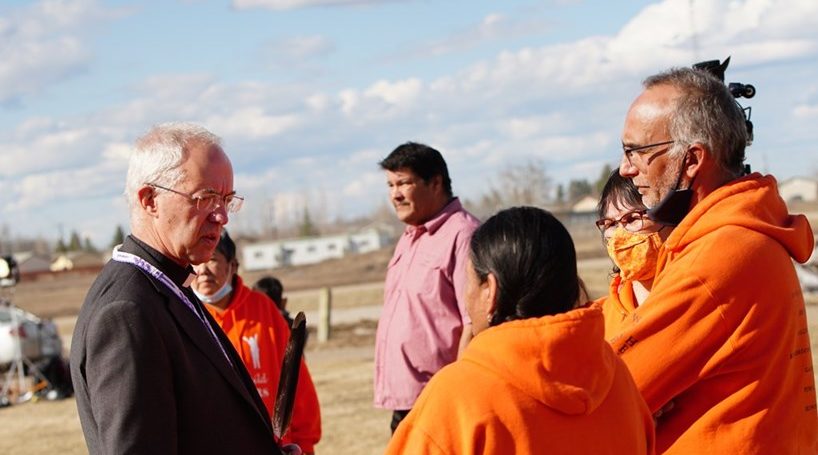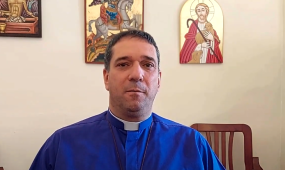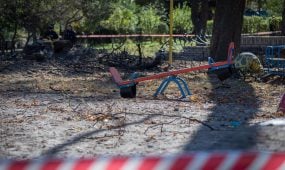"We built hell and put your children in it": Archbishop Welby apologises to Indigenous Canadians
News
The Archbishop of Canterbury has apologised for the Church of England’s part in the “structural sins of racism and discrimination” committed against the Indigenous peoples of Canada over decades

The Archbishop of Canterbury has apologised for the Church of England’s part in the “structural sins of racism and discrimination” committed against the Indigenous peoples of Canada over decades.
Speaking during his four-day visit to the country over the weekend (News, 22 April), Archbishop Welby, who heard testimonies from survivors of residential schools, also apologised for both the Church’s complicity in and direct responsibility for the “uninspected, unsupervised, uncriticised, unchallenged…cruelties they handed out indiscriminately to the most innocent and the youngest”.
Archbishop Welby’s apologies follow those of the Anglican Church of Canada given by Archbishop Michael Peers and Archbishop Fred Hiltz in 1993 and 2010 respectively. Between 1820 and 1969, the Canadian Church administered about 30 residential schools and hostels for Indigenous children. Since the late 1980s, survivors have spoken of how the schools denigrated their culture, to the accompaniment of physical and sexual abuse.
Archbishop Welby told an Indigenous gathering in Prince Albert on Sunday: “I’ve listened to the stories of grief and humiliation…and structural sin — not just individual sin, which has been terrible enough. Structural in society and, worse still, in the Church. Sins of racism and discrimination. The greatest evils we can face.”
He continued: “I wish again, truly and deeply, and with humiliation as well as humility, to apologise for the broken relationship between the Church of England and the First Nations, the Inuit and the Métis peoples of Canada. We did not fulfil our historic commitment to be an advocate, ally, and relative for you. Instead of standing with you, we abandoned you.
“Instead of advocating for you, we became complicit in, and often directly responsible for, residential schools — uninspected, unsupervised, uncriticised, unchallenged in the cruelties they handed out indiscriminately to the most innocent and the youngest.”
Advertisement
The purpose of the trip was atonement and reconciliation. Archbishop Welby spoke of the “shaming and devastating” chasm between “what could have been — legally, culturally, intellectually, structurally, in infrastructure, in every area of life, in the experience of generations” and the legacy of the Church’s failed promises.
“Never have I sat and listened to so many stories in which suicide is normative,” the Archbishop said. He understood from his own experience (both his parents were alcoholics) “the attempt to escape from the horrors of memory and lived experience”.
He continued: “History cannot truly be in the past until it has been fully healed. New atrocities continue to come to light. I know the past is deeply present in your lives, your memories and your expressions of life and culture. I know you carry the weight of generations of grief and trauma.”
Archbishop Welby expressed his commitment to listening, learning, and taking action towards reconciliation, starting by addressing the rights of Indigenous peoples around the world at the Lambeth Conference in July.
Advertisement
“I am sorry that the Church was not there for you when we should have been your greatest friends…I am sorry that the Church belittled your spirituality, denigrated, and undermined your culture, traditions, and, above, all your languages, and abused your rights. And I am sorry that, in an eagerness to share the good news of Jesus Christ, we committed an indefensible sin of the arrogant assumption that we ‘brought God to you’ rather than understanding and seeking to listen.”
Giving the example of his opposition to the Rustat memorial from the chapel of Jesus College, Cambridge, which a consistory court ruled in March should not be removed (News, 14 April; 25 March), despite its links to the slave trade, Archbishop Welby said: “I promise that, even where we cannot change things, I will support and encourage the support of the First Nations, the Méti, and the Inuit in seeking justice. I will stand with you while I am in post, even if we fail.”
On Saturday, the Archbishop visited James Smith Cree Nation in Saskatchewan, where he met local chiefs and adults who had been sent to residential schools. The Archbishop also joined a “Gospel Jamboree” — an Indigenous expression of faith that nurtured communities when traditional practices were banned under colonial law.
Describing residential schools as a “bit of hell” built by the Church, he said: “For that terrible crime, sin, evil, of deliberately, consciously, stupidly — because evil is stupid — building hell and putting children into it, and staffing it, I am more sorry than I could ever, ever begin to express.” He said that he spoke “both personally and in my role as Archbishop of Canterbury…I am ashamed. I am horrified.”
On his way to Canada, on Thursday, Archbishop Welby visited the Virginia Theological Seminary (VTS) in the US, where he spoke of the environmental crisis in an address titled “The Hot War with Creation: Can we make peace?” The president of the VTS, the Very Revd Dr Ian S. Markham, told the Episcopal News Service: “The Archbishop’s visit and his remarks remind us of the incredible challenges that global warming presents to the wider Communion and to the world, especially in the Global South — and the sacrifices we must make, especially in the Global North, to save precious lives.”
First published in Church Times on 3 May 2022. Visit the Church Times website to subscribe today.





